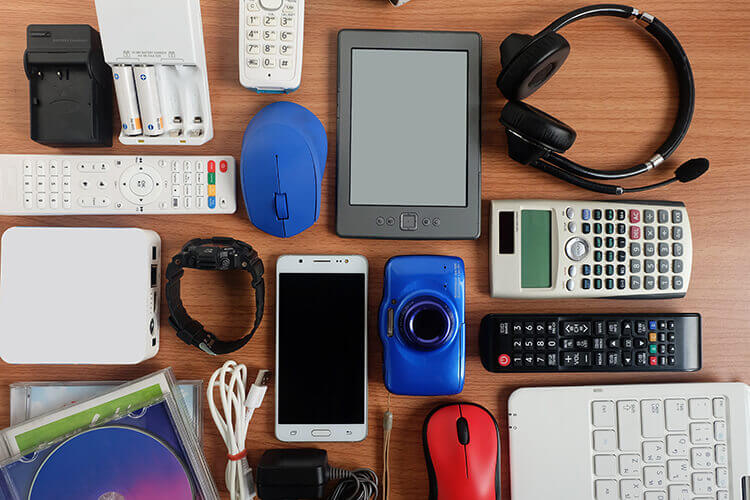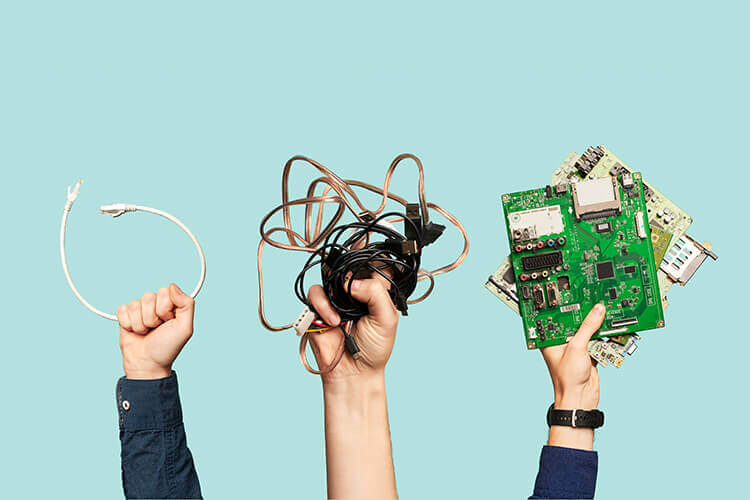
Choose to refuse
Say no to single-use plastic and needless packaging. Find out more ways you can cut down on your waste.
Posted on: December 10, 2019
Disclaimer: This blog reflects information accurate at the time of its original publication. It has been preserved for archival purposes and may not reflect the most up-to-date details or developments.
Electronic waste (commonly referred to as e-waste) is Australia’s fastest growing type of waste. Nationally we produce around 700,000 tonnes of it annually - that’s around 28kg per person.

Upgrading your TV set, laptop or washing machine can often be an all-consuming task, but it’s important to also think about what you are going to do with the old item it’s about to replace.
We’ll give you a hint, the answer should never be “put it in the bin”. Read on and you’ll find out why!
Let’s start at the beginning – understanding what items are classified as e-waste. All you need to remember is that if it has a plug, battery or cord its considered e-waste!
Common household e-waste includes:
Aside from the fact that around 95% of e-waste is recyclable (by weight), there are some compelling reasons to take the right steps to keep no-longer wanted items out of landfill.

Together we need to keep e-waste OUT of landfill
Often people ‘upgrade’ electronic goods before the original item has reached the end of its life.
It’s worth remembering that there’s a market for second-hand electronics in good working order (just take a look at Gumtree or Facebook Marketplace), so consider whether your item may be in a condition to sell.
Parts can often be salvaged by others so think about offering broken items to handy friends, within your local Buy Nothing group, or on the ‘Free’ section of Gumtree before you decide to throw it away.
You can also see if the item is repairable (repair cafés can be a good first port-of-call if you’re not confident tackling it yourself) and remember, if it’s repaired then it’s no longer e-waste!
The good news is that there are national schemes in place to ensure televisions, computers, IT equipment and mobile phones are recycled free of charge.
.jpeg)
If you can, identify a local drop-off point for your e-waste.
The best way to recycle e-waste is to take it to a drop-off point yourself (this prevents the looting of valuable components that may occur when items are left out for verge-side collection, which creates mess and reduces the volume of material that the professional e-waste recycler will be able to recover from your item).
Desktop computers, laptops, tablets, mice, monitors, printers, scanners, multifunction printers, keyboards, computer power supplies, printed circuit boards, motherboards, network cards, disks and CD drives can all be returned to an Officeworks store (just remember that you can only bring up to five items at a time and that at the time of writing there are 10 stores with drop off points in WA – you can find a list here). You can also recycle these items (as well as televisions) at one of the 17 TechCollect drop-off points in the Perth metropolitan area.
Look for a MobileMuster drop off point (you can typically find these at mobile phone shops, Officeworks stores) or head to an Australia Post and pick up a free satchel to post your old phone back. Phones (plus their batteries and chargers) are about 98% recyclable.
It is always best to check with your local government authority in the first instance to find out what they recommend as some provide on-demand collections, others have nominated drop-off points that operate year-round, and others run special collection days.
If you live in the Perth metropolitan area it may also be worth noting that you can drop off your e-waste (excluding fridges and freezers) free of charge at the Balcatta Recycling Centre and the Tamala Park Recycling Centre. There is also an e-waste drop off point at Henderson Waste Recovery Park, however if you aren’t a City of Cockburn resident, fees will apply.

Say no to single-use plastic and needless packaging. Find out more ways you can cut down on your waste.
.jpg)
7 delicious ways to avoid food waste and use up leftovers creatively.

Giving items a second life is one of the best ways to be a GREAT Sort. These are our – and your – favourite op shops in Perth and further afield. Last updated: July 2022